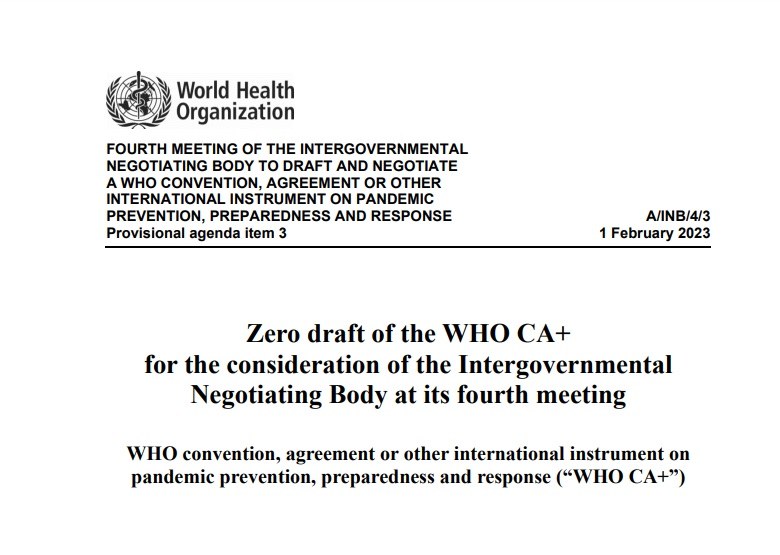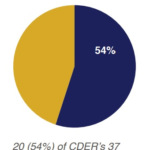1.「WHO CA+」の背景
「WHO CA+」とは、COVID-19パンデミックへの対応において国際社会(=「WHO」と言い換えることができるかもしれません)が連帯と公平性を示すことができなかったことを踏まえ、WHOの政府間交渉機関(Intergovernmental Negotiating Body (INB))において起草され、現在議論されている、パンデミックの予防、準備、対応に関して加盟国に対して法的拘束力を有することとなる新たな条約、協定、その他の国際文書(WHO convention, agreement or other international instrument on pandemic prevention, preparedness and response)のことです。
WHOの世界保健総会(the World Health Assembly)により、「WHO CA+」の起草と交渉を行うための全ての加盟国に開かれたINBが設置され、その草案「ゼロ ドラフト(Zero draft)」を作成することが合意されました(2022.12.07 WHO Member States agree to develop zero draft of legally binding pandemic accord in early 2023)。
2023年2月1日、とうとう「WHO CA+」のゼロ ドラフトが公開され、これが交渉開始の基礎として、2月27日~3月3日にジュネーブで開催されるINB第4回会議で議論される予定です(Intergovernmental Negotiating Body 27 February – 3 March 2023)
- A/INB/4/1 Provisional agenda
- A/INB/4/3 Zero draft of the WHO CA+ for the consideration of the Intergovernmental Negotiating Body at its fourth meeting WHO convention, agreement or other international instrument on pandemic prevention, preparedness and response (“WHO CA+”)
2.「WHO CA+」のゼロ ドラフトにおける知的財産の位置づけ
 以下に抜粋した「WHO CA+」のゼロ ドラフトの前文の項37から46には、TRIPS協定や知的財産について言及されています。
以下に抜粋した「WHO CA+」のゼロ ドラフトの前文の項37から46には、TRIPS協定や知的財産について言及されています。
特に、項40から項43には、知的財産の重要性について言及されているますが、他方で、医薬品等へのアクセスに知的財産はネガティブな効果についての懸念があることを前提とした言及が盛り込まれています。
37. Recalling the Doha Declaration on the TRIPS Agreement and Public Health of 2001 and reiterating that the Agreement on Trade-Related Aspects of Intellectual Property Rights (TRIPS Agreement) does not and should not prevent Members of the World Trade Organization from taking measures to protect public health,
38. Reaffirming that the TRIPS Agreement can and should be interpreted and implemented in a manner supportive of the right of Members of the World Trade Organization to protect public health and, in particular, to promote access to medicines for all,
39. Reaffirming that Members of the World Trade Organization have the right to use, to the full, the TRIPS Agreement and the Doha Declaration on the TRIPS Agreement and Public Health of 2001, which provide flexibility to protect public health including in future pandemics,
40. Recognizing that protection of intellectual property rights is important for the development of new medical products, but also recognizing concerns about its effects on prices, as well as noting discussions/deliberations in relevant international organizations on, for instance, innovative options to enhance the global effort towards the production of, timely and equitable access to, and distribution of health technologies and know-how, by means that include local production,
41. Recognizing that protection of intellectual property rights is important for the development of new medicines, and also recognizing concerns about the negative effect on prices and on the production of, timely and equitable access to, and distribution of vaccines, treatments, diagnostics and health technologies and know-how,
42. Recognizing that intellectual property protection is important for the development of new medicines, and also recognizing concerns about its effect on prices, as well as noting discussions on enhancing global efforts towards the production of, timely and equitable access to, and distribution of health technologies and products,
43. Recognizing the concerns that intellectual property on life-saving medical technologies continues to pose threats and barriers to the full realization of the right to health and to scientific progress for all, particularly the effect on prices, which limits access options and impedes independent local production and supplies, as well as noting structural flaws in the institutional and operational arrangements in the global response to the COVID-19 pandemic, and the need to establish a future pandemic prevention, preparedness and response mechanism that is not based on a charity model,
44. Reaffirming the flexibilities and safeguards contained in the TRIPS Agreement and their importance for removing barriers to production of, and access to, pandemic-related products, as well as sustainable supply chains for their equitable distribution, while also recognizing the need for sustainable mechanisms to support transfer of technology and know-how to support the same,
45. Reaffirming the flexibilities and safeguards contained in the TRIPS Agreement and their importance for ensuring access to technologies, knowledge and full transfer of technology and knowhow for production and supply of pandemic-related products, as well as their equitable distribution,
46. Recalling resolution WHA61.21 (2008) on the global strategy and plan of action on public health, innovation and intellectual property, which lays out a road map for a global research and development system supportive of access to appropriate and affordable medical countermeasures, including those needed in a pandemic,
しかし、医薬品等へのアクセスの問題は、知的財産が影響していることよりも、むしろ流通やその国の医療制度・インフラの欠如にあります。
これら知的財産を危険視することを前提としたドラフトには、開発途上国からの政治的な圧力を感じざるを得ません。
このままWHOの中で法的拘束力のある条約の合意に至れば、むしろ公衆衛生の発展に向けたイノベーションを抑制しかねない結果となるかもしれず、日本政府は圧力に屈せず、他国と協働して粘り強く議論・交渉をしてほしいと思います。
といいますか、日本政府のこのような国際問題への取り組みや政策方針は一体どうなっているのか、どうしたいのか、具体的なものが全く発信されていない、または発信されていたとしても全く世の中に届いていないように思われます。
医薬品アクセスと知的財産に関する記事:
- 2022.12.17記事: WTO TRIPS理事会 COVID-19診断薬・治療薬への「TRIPS waiver」拡大議論 決議延期を勧告


- 2021.11.14記事: TRIPS協定及び公衆衛生に関する宣言(ドーハ宣言)から20年


- 2020.12.03記事: 知的財産権とCOVID-19についての製薬団体のステートメント

3.「WHO CA+」とデジタル配列情報(DSI)との関係
また、生物多様性条約との関係でも、「WHO CA+」においてどのような枠組みの調整がなされるのかも気になるところです。
WHO CA+ゼロ ドラフト前文の項48には、以下のように生物多様性条約・名古屋議定書で定める遺伝資源と利益配分に関する言及とともに遺伝配列情報についての言及もあります。
将来起こり得るパンデミックという緊急事態に対応するために、パンデミックを引き起こすようなウイルス等の病原体の情報へのアクセスが妨げられてはいけないことはもちろんですが、生物多様性条約締約国会議で進められている多国間枠組み議論における「デジタル配列情報(DSI)」の扱いについて利益配分となるのか否か、またはどのような仕組みとなるのかといった論点等とWHO CA+との整合はどのように行われるのか、これはWHOだけで議論できる問題ではないように思います。
関連記事:




コメント
A/INB/4/6: Report of the meeting
https://apps.who.int/gb/inb/pdf_files/inb4/A_INB4_6-en.pdf
“Following the adoption of the agenda and programme of work, the INB agreed to the proposal by the Bureau regarding the modalities contained in document A/INB/4/4, including that the fourth and fifth meetings of the INB were considered as an integrated set, with both focusing on Member State discussions and negotiations. It was clarified that there would be a single deadline for textual proposals; no later than close of business on 14 April 2023. All inputs and additions to the zero draft should be available to drafting group participants. The INB agreed to the WHO zero draft CA+ as the basis for “first reading” and commencing negotiations, on the understanding that nothing is agreed until everything is agreed. The INB proceeded in a drafting group, holding a “first reading”, going through the draft article-by-article, and then commenced a textual discussion and proposed edits to the zero draft.”
2024.05.24 WHO press release: WHO Member States agree to share outcomes of historic IHR, pandemic agreement processes to World Health Assembly
WHO加盟国は、COVID-19パンデミックを受けて、将来のパンデミックや感染拡大に対応する世界的な能力強化を目的とした政府間交渉機関(INB)の第9回再開会議での集中的な交渉を終了、最終合意には至らなかったようです。月曜日から始まる次回の世界保健総会での検討のために作業結果を提出する予定とのことです。
https://www.who.int/news/item/24-05-2024-who-member-states-agree-to-share-outcomes-of-historic-ihr–pandemic-agreement-processes-to-world-health-assembly
議論されたWHOパンデミック協定のドラフトが公開されています。
A/INB/9/3 Rev.1
22 April 2024
Proposal for the WHO Pandemic Agreement
https://apps.who.int/gb/inb/pdf_files/inb9/A_inb9_3Rev1-en.pdf